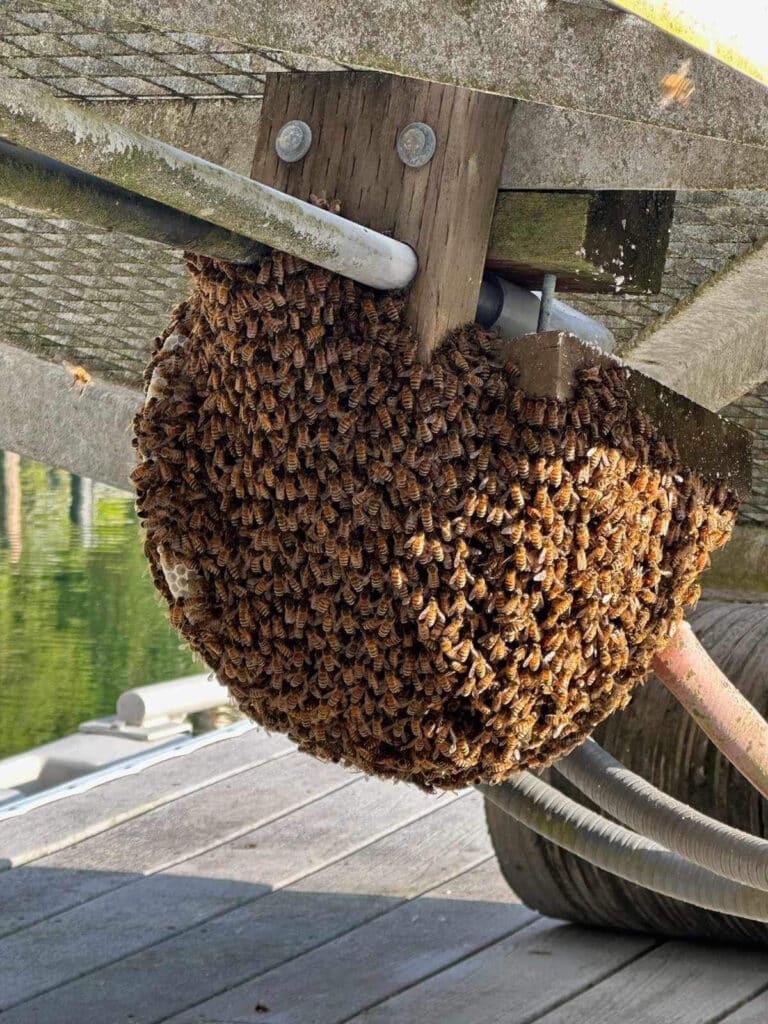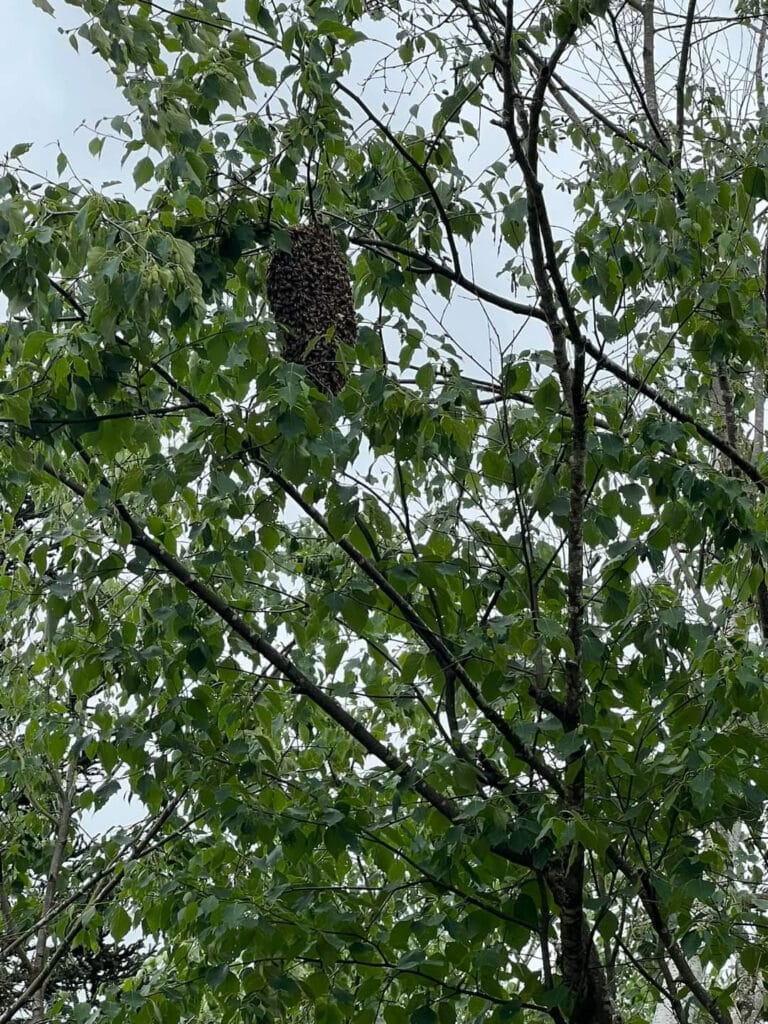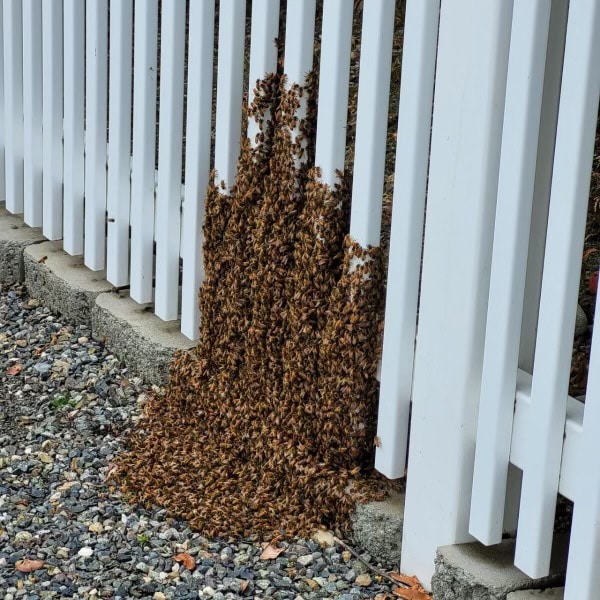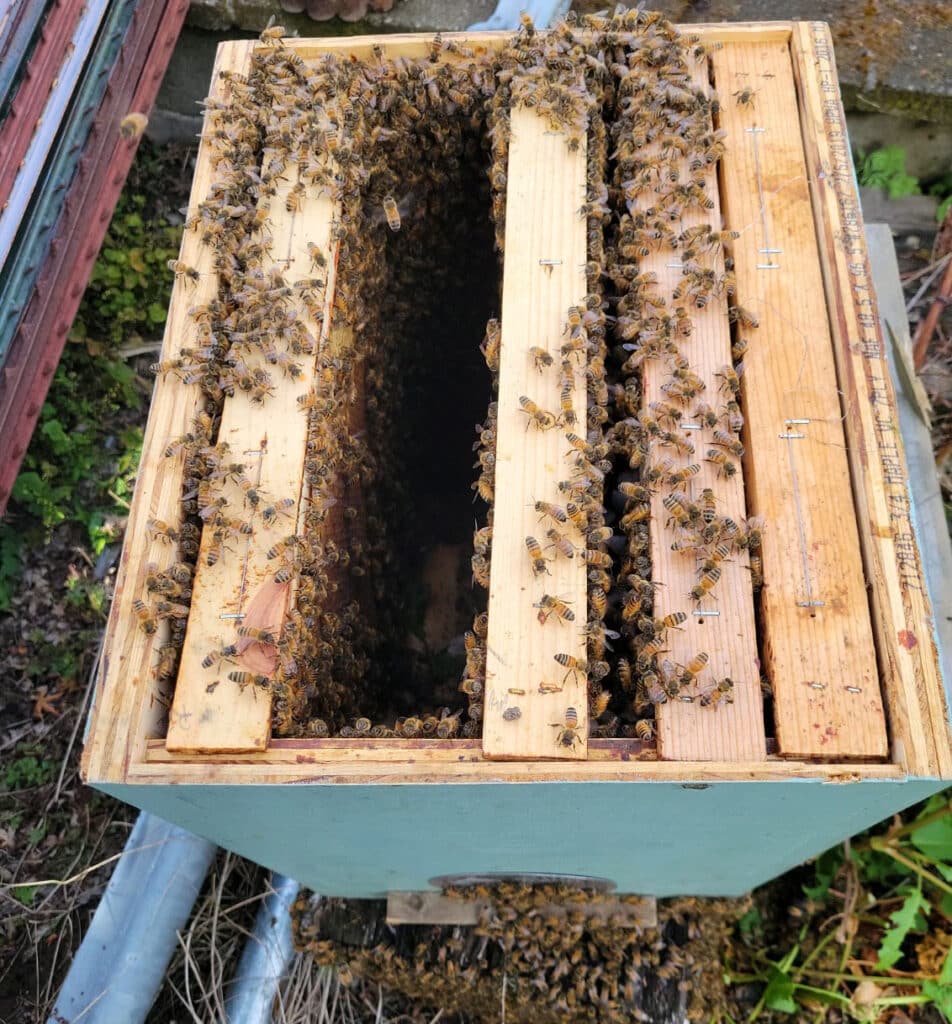Community Environment Health & Wellness
What to do when honey bees swarm
As the weather warms and honey bees start to get busy, their hives can get crowded. When that happens, the bees go out to look for a new home, and swarms of them can end up in unlikely and unwanted places.
Community Sponsor
Community stories are made possible in part by Peninsula Light Co, a proud sponsor of Gig Harbor Now.
Swarms of honey bees can be disconcerting for property owners, but the Pierce County Beekeepers Association can help relocate them. The organization is focused on the backyard honey bee population and works to support local beekeepers and educate the public.
Kathleen Clerc, vice president of the association, maintains hives in Gig Harbor as well as Tacoma. She is one of 60 association members who respond when Pierce County property owners call about an unwanted swarm.
Western vs. native bees
She said that while native honey bees are endangered, the Western honey bee is considered an agricultural product. Their numbers are strong.

A swarm of Western honey bees decided that the Fox Island bridge would be a great place to set up a new home. Curtis Blunk, a member of the Pierce County Beekeepers Association, responded to rescue the bees.
Photo courtesy of Pierce County Beekeepers Association
Western honey bees eat “anything off the table,” Clerc said.
“Even with 50% colony loss in the 2022 winter, we still have more (Western honey bees) than have ever been in history, because they are maintained by man,” she said.
Native bees are more picky and consume only “a few different plants.” That population is struggling.
“The specialist bees decline when we take away their habitat. The answer is to plant more native plants,” Clerc said.
Why they swarm
Honey bees have a fascinating social structure. They swarm — on houses, bushes or buildings — when the queen no longer has space to lay eggs, Clerc said. The bees go out to scout for a new home.
“They will come back with no less than six qualifying factors, including location, distance to resources, sun position, and they will dance it out, and if you can interpret these dances, you can pinpoint on a map where they are going,” she said.
She said honey bees have a democratic society. Once they are all dancing the same dance — a unanimous vote, so to speak — they fly to a new destination. The queen will take about 60 percent of her workers and buzz to the agreed-upon area.

Another swarm on Fox Island in 2023 settled in a tree before being rescued and moved into a hive box. Swarms are not aggressive, and should be left alone until a beekeeper can remove them. Photo courtesy of Mary Dempsey.
“The problem is that it might be pretty far away, and they get tired, so they will stop on your car, or on a bush, or building in town and they cluster around the queen to protect her,” she said. “Swarms are incredibly docile. People are intimidated and think they are dangerous, but a swarm is the most docile that they will ever be.”
Swarm season
The association has fielded more than 25 swarm calls already this season, president Mary Dempsey said. The swarm season usually tapers off by the end of June, but it does continue into the summer months. She keeps a list of members who are willing to rescue swarms, and strives to be fair. For a beekeeper, rescuing a swarm means free bees, which can be exciting, said Clerc.
“Typically someone will call or text me a picture, and I will identify the bee, and tell them what they can do,” Dempsey said.
If the swarm is not honey bees, Dempsey provides the property owner with other resources. Sometimes that may mean an exterminator. If the bees are tolerable, she suggests that people just wait it out.
Bumble bees, for instance, are great pollinators and die in the fall. And, as much as yellowjackets are uniformly disliked, she said they also serve a purpose.
“They have a significant, and beneficial place in the ecosystem,” she said. “Some people will offer them food in an alternate location in their yard, and that way they leave your stuff alone.”
Quiet winters
Honey bees aren’t as active in the winter, but Clerc and Dempsey said they don’t hibernate. A hive needs about 100 pounds of honey to sustain itself through the winter. Dempsey said she leaves them 100 and takes 100 for herself.

Once beekeeper Mary Dempsey arrived and located the queen, the hive moved down to a fence, then the ground before finally crawling into a hive box.
“They go into a slower mode,” Dempsey said. “In the summer there can be 60,000 in a hive, and by fall they dwindle down to form a cluster, and they move around to stay warm and eat.”
Although Jason Faber lives in Spanaway, he responds to calls for swarms throughout the county, including Gig Harbor. He said the best advice he can give is to put lemongrass essential oil in the back of a box and let the bees move into it. He said the oil must mimic the pheromone given off by a queen, and it draws the bees.
Do not spray
When he responds to a swarm call, he said he comes with a pre-loaded box, a ladder, extender pole, and a bucket for the ones that he has to retrieve from branches. Once he arrives, he assesses the situation, and begins the work of locating the queen.
“I usually hand-scoop some of them, and if I get the queen in a clip, they will follow,” he said. “I like to leave the box there for 24 hours, and that way they know that this is their home now.”
Calling a beekeeper is the best way to deal with an unwanted swarm of honeybees, Dempsey said.

Mary Dempsey, president of the Pierce County Beekeepers Association, found the queen in this swarm, put the queen into the hive box, and the rest of the honey bees walked into the box to join their queen.
Photo courtesy of Mary Dempsey
“If you come across a swarm in your yard, do not spray them with water or insecticide,” she said. “Please call an association and someone will come and get the swarm. Cold, wet bees will die, and insecticide will kill them.”
For more information about the Pierce County Beekeepers Association, and Western honeybee backyard beekeeping, or to report an unwanted swarm, visit pcbeekeepers.org or call 253-640-1615.

